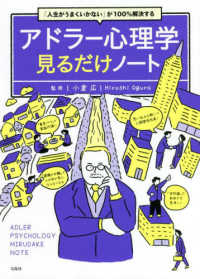基本説明
Considers the economic impact of reducing smoking rates on tobacco farmers, cigarette factory workers, the southeastern regional economy, state governments, tobacco retailers, the hospitality industry, and nonprofit organizations who might benefit from the industry's philanthropy.
Full Description
States have banned smoking in workplaces, restaurants, and bars. They have increased tobacco tax rates, extended "clean air" laws, and mounted dramatic antismoking campaigns. Yet tobacco use remains high among Americans, prompting many health professionals to seek bolder measures to reduce smoking rates, which has raised concerns about the social and economic consequences of these measures. Retail and hospitality businesses worry smoking bans and excise taxes will reduce profit, and with tobacco farming and cigarette manufacturing concentrated in southeastern states, policymakers fear the decline of regional economies. Such concerns are not necessarily unfounded, though until now, no comprehensive survey has responded to these beliefs by capturing the impact of tobacco control across the nation.
This book, the result of research commissioned by Legacy and Columbia University's Institute for Social and Economic Research and Policy, considers the economic impact of reducing smoking rates on tobacco farmers, cigarette-factory workers, the southeastern regional economy, state governments, tobacco retailers, the hospitality industry, and nonprofit organizations that might benefit from the industry's philanthropy. It also measures the effect of smoking reduction on mortality rates, medical costs, and Social Security. Concluding essays consider the implications of more vigorous tobacco control policy for law enforcement, smokers who face social stigma, the mentally ill who may cope through tobacco, and disparities in health by race, social class, and gender.







